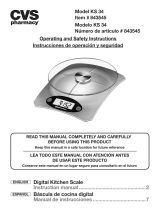Silvercrest 385528 is a digital kitchen scale designed to weigh out and tare amounts of food. It has a max. measuring range of 176 oz / 11 lb /175 fl oz / 5000 g / 5000 ml with a graduation of 0.05 oz / 0 lb: 0.1 oz / 0.05 fl’oz / 1 g / 1 ml. The digital kitchen scale has a large, easy-to-read LC display and three buttons: TARE, UNIT, and MODE. The TARE button allows you to reset the scale to zero, the UNIT button allows you to change the unit of measure, and the MODE button allows you to change the weighing mode. The scale is powered by a single CR2032 3V battery.
Silvercrest 385528 is a digital kitchen scale designed to weigh out and tare amounts of food. It has a max. measuring range of 176 oz / 11 lb /175 fl oz / 5000 g / 5000 ml with a graduation of 0.05 oz / 0 lb: 0.1 oz / 0.05 fl’oz / 1 g / 1 ml. The digital kitchen scale has a large, easy-to-read LC display and three buttons: TARE, UNIT, and MODE. The TARE button allows you to reset the scale to zero, the UNIT button allows you to change the unit of measure, and the MODE button allows you to change the weighing mode. The scale is powered by a single CR2032 3V battery.




















-
 1
1
-
 2
2
-
 3
3
-
 4
4
-
 5
5
-
 6
6
-
 7
7
-
 8
8
-
 9
9
-
 10
10
-
 11
11
-
 12
12
-
 13
13
-
 14
14
-
 15
15
-
 16
16
-
 17
17
-
 18
18
-
 19
19
-
 20
20
-
 21
21
-
 22
22
-
 23
23
-
 24
24
-
 25
25
-
 26
26
-
 27
27
-
 28
28
Silvercrest 385528 is a digital kitchen scale designed to weigh out and tare amounts of food. It has a max. measuring range of 176 oz / 11 lb /175 fl oz / 5000 g / 5000 ml with a graduation of 0.05 oz / 0 lb: 0.1 oz / 0.05 fl’oz / 1 g / 1 ml. The digital kitchen scale has a large, easy-to-read LC display and three buttons: TARE, UNIT, and MODE. The TARE button allows you to reset the scale to zero, the UNIT button allows you to change the unit of measure, and the MODE button allows you to change the weighing mode. The scale is powered by a single CR2032 3V battery.
Ask a question and I''ll find the answer in the document
Finding information in a document is now easier with AI
in other languages
Related papers
-
Silvercrest 337314 Owner's manual
-
Silvercrest 358887 Owner's manual
-
Silvercrest 340369 Owner's manual
-
Silvercrest 387542 Owner's manual
-
Silvercrest 387542 Owner's manual
-
Silvercrest 399016 Owner's manual
-
Silvercrest 294840 Owner's manual
-
Silvercrest 329287 Owner's manual
-
Silvercrest 283998 Owner's manual
-
Silvercrest 295458 Owner's manual
Other documents
-
RAMTONS RM/299 User manual
-
Guangdong Welland Technology KG65-M User manual
-
Livoo DOM354W User manual
-
Sencor SKS 7700BK User manual
-
Livoo DOM383 User manual
-
Becken BALANCA DE COZINHA BKS5043 Owner's manual
-
Auriol 284995 Operation and Safety Notes
-
 CVS Pharmacy KS 34 User manual
CVS Pharmacy KS 34 User manual
-
Crofton 3951-14 User manual
-
Crofton 3951-14 User manual




























